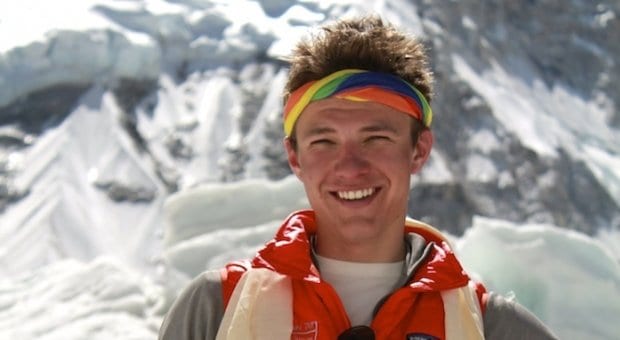Cason Crane just turned 21. Adventurous by nature, the New Jersey native has always had a passion for the outdoors and a love for challenging himself. Openly gay, he is also keenly aware of the sometimes-insurmountable odds facing LGBT youth and of the incredible tragedy that is teen suicide. During his junior year of high school, Crane lost a friend and classmate to suicide — an event that affected him deeply.
In July of 2013, he became the first openly gay man to climb the Seven Summits, successfully ascending the seven tallest peaks on each continent. Dubbed the Rainbow Summits project, Crane turned his climbs into a fundraising initiative and has managed to raise nearly $135,000 for The Trevor Project, a US-based suicide-prevention hotline for LGBT youth.
Crane first got his taste for mountain climbing at 15 when he ascended Mt Kilimanjaro in Tanzania. “It’s actually very similar to hiking,” he says of mountaineering.
In February 2012, he got underway with Mt Aconcagua in Argentina, the highest peak in the Andes. “I wanted to make sure going into this, before I really started the fundraising and awareness raising, I wanted to make sure that I could actually climb these mountains. That was my test peak. I also had to prove it to my parents as well.” His parents were convinced, and soon he was on his way up peaks around the globe.
Crane’s training regimen involved jogging, swimming and lots of running up stairs, both in the gym and outdoors. Each successive climb allowed him to prepare for the next one. “Each climb builds on the last. You climb these mountains in an order that allows you to build skills and develop techniques,” he says.
In the space of about 18 months he summited Aconcagua, Mt Elbris in Russia, Mt McKinley (also known as Denali) in Alaska, Carstensz Pyramid in Indonesia and Mt Kosciuszko in Australia (both considered the highest peak in Oceania, depending on your definition), Mt Vincent in Antarctica and Mt Everest on the border between Tibet and Nepal. His Kilimanjaro climb at 15 counted toward the Seven Summits goal; Denali took two attempts before his successful climb in July of 2013. “I was on a pretty tight schedule,” Crane says with a chuckle. “I was trying to get it all in before I started university.”
Mt Everest in particular was a special accomplishment. “It was really one of those things that had always been a lifelong dream of mine. So I mean, to make it to the top was just a magical moment for me. I truly couldn’t stop crying. As soon as the tears left my tear ducts, they froze.”
When he reached Everest’s summit, he released more than 20 prayer flags that he had brought with him, given to him by friends, relatives and even strangers in memory of LGBT youth lost to suicide. “I felt for a long time that I really wanted to try to make a difference on this issue,” he says. “I wanted to be able to find a way to contribute my unique talents and my interests in a way, because I felt like that was the best way to really make the most out of it, to make the biggest difference.
“I did a lot of research on what organization to support, and The Trevor Project is just — it’s such a fantastic organization. It’s the leading suicide prevention service for LGBTQ youth in the United States, and frankly, it’s got some of the best services . . . for LGBTQ youth around the world,” Crane says. “I felt like it was a natural fit for the project.”
The organization provides a 24-hour crisis hotline for youth considering suicide, as well as text, chat and social media tools. “So often technology is used by bullies to bully, and they’re actually taking it, you know, reclaiming it and harnessing it as a tool for preventing suicide.”
Thanks to his successful completion of the Rainbow Summits project, Crane was named one of Out magazine’s Out 100 for 2013, an auspicious honour he shares with Sir Ian McKellan, George Takei, Laverne Cox, Kate Bornstein and Janet Mock, among others. “I was so honoured and, I mean, really humbled to be on that list,” he says. “I was so surprised when I got that email because these people are legends.”
Crane is now on a speaking tour, and after that he’s headed to Princeton to study for a degree in international relations. “I just finished my first semester of classes, and I’ll tell you what, it is a big challenge,” he says. But if anyone is up to the task, it’s Crane. “If there’s one thing I’ve learned, it’s that no challenge is insurmountable.”


 Why you can trust Xtra
Why you can trust Xtra


